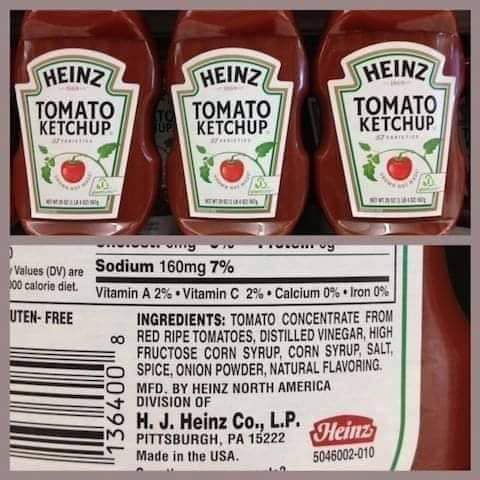Ketchup has long held a place on our kitchen tables, picnic spreads, and restaurant trays, often paired with fries, burgers, and even eggs. Its tangy-sweet flavor makes it a go-to condiment for many Americans, with Heinz being one of the most recognized and widely used brands in the market.

However, what most consumers don’t realize is that behind the familiar red label and nostalgic taste, Heinz Ketchup contains ingredients that could pose serious health risks. One of the primary concerns is the inclusion of high fructose corn syrup (HFCS), a processed sweetener that has been linked to a range of health issues. HFCS is not just any sugar—it’s made through an intensive industrial process where corn starch is treated with enzymes to convert glucose into fructose, making it far sweeter than regular sugar.
The corn used in this process is often genetically modified, which adds another layer of concern for those trying to avoid GMOs. When you consume HFCS, your body processes it differently than natural sugars. Unlike glucose, which triggers insulin release and helps your body feel full, fructose doesn’t signal fullness and instead heads straight to the liver. Over time, this can lead to fatty liver disease, insulin resistance, and increased levels of triglycerides, which are all major risk factors for heart disease.
Beyond the metabolic effects, HFCS has also been connected to weight gain and obesity. A groundbreaking study conducted at Princeton University compared the effects of HFCS to those of table sugar in laboratory rats. Two groups of rats were given sweetened water—one with HFCS and the other with regular sugar. Even though both groups consumed the same number of calories, the HFCS group gained significantly more weight, especially around their midsections, and showed higher levels of blood fat.
These results suggest that HFCS may uniquely contribute to obesity and related health issues, even when calorie intake is controlled. The research also indicated that rats fed HFCS developed characteristics similar to metabolic syndrome, a cluster of conditions that increase the risk of heart disease, stroke, and diabetes. While many food companies have responded to growing health awareness by reducing or eliminating HFCS from their products, Heinz continues to include it in their ketchup, particularly in their classic recipe. This is concerning because ketchup is often consumed in large amounts over time, especially by children and families who use it daily as a dip or sandwich topping. Continuous, even small, daily consumption of HFCS can accumulate and impact health in the long term. For those seeking to maintain a healthy lifestyle, reading ingredient labels has never been more important. The good news is that there are now many ketchup alternatives on the market that avoid high fructose corn syrup entirely. Brands that use natural sweeteners like cane sugar or even offer organic versions are becoming more common, and in many cases, they taste just as good if not better. Another option for the health-conscious consumer is to make homemade ketchup, which allows complete control over what goes into it—from choosing organic tomatoes to using spices and natural sweeteners like honey or maple syrup. While it may take a bit more effort than grabbing a bottle off the shelf, homemade ketchup ensures you’re not unknowingly consuming ingredients that could harm your health over time. In a world where processed foods often dominate our meals, it’s easy to overlook the hidden dangers in something as seemingly innocent as a condiment. But small choices add up, and avoiding products with harmful ingredients like HFCS can have a big impact on long-term wellness. Heinz Ketchup may be a staple in many households, but considering the mounting evidence against high fructose corn syrup, it might be time to rethink its place at your table. Choosing a healthier alternative or making your own version could be a small yet powerful step toward protecting your health and the health of your loved ones. So the next time you reach for a bottle of ketchup, remember that not all condiments are created equal—and sometimes, avoiding a familiar brand is the best decision you can make for your well-being.





